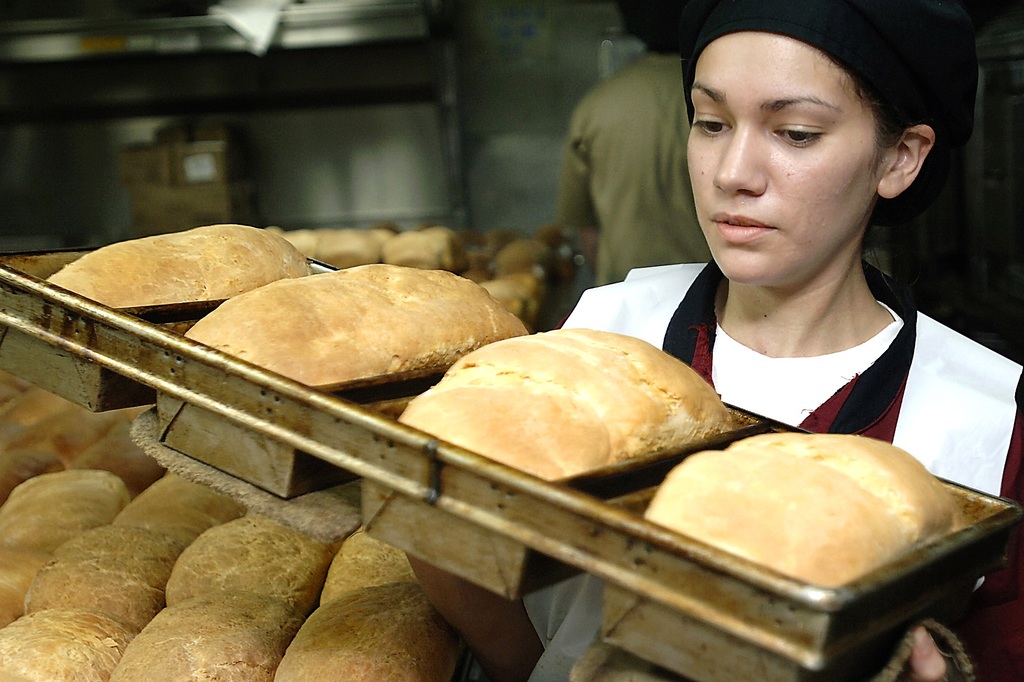Man can do what he wills but he cannot will what he wills.
Arthur Schopenhauer
We are not going to be able to operate our Spaceship Earth successfully, nor for much longer, unless we see it as a whole spaceship and our fate as common. It has to be everybody or nobody.
Buckminster Fuller
We shape our tools and thereafter our tools shape us.
John M. Culkin (provenance unclear – see here)
The genius of capitalism is also its fatal flaw – and that thing is specialisation. In simplest terms it means that the baker can just focus on baking, the cobbler can just focus on making shoes, the builder can just focus on building and at the end of the day each person gets everything they need – food, clothing and shelter … and much more.
Early humans did not have that luxury. Although there was probably some specialisation in tribal groups, most people had to know how to find or grow food, use animal skins to keep warm and if shelters were built they would have been built by the community in whatever time was left over after finding and preparing food.
As societies got bigger and more complex there would have been increasing specialisation, but the tool which made very high levels of specialisation possible was the invention of money.
The world before money
Exchange existed long before money, but it was based on relationships. In fact relationships were the most important thing and being able to give things to others would have strengthened those relationships. This is an important point to grasp. As David Graeber points out in Debt, the first 5000 years: cultures that don’t have money operate a kind of gifting economy where giving is not just a virtue but a social obligation, especially when someone asks for something or has a need for something. In these cultures, exchange doesn’t happen as barter (I’ll trade my pig for your yams) but as social glue binding the tribe together in bonds of mutual indebtedness. If Jesse has given Jo some eggs, then Jo is indebted to Jesse and that’s a good thing because if a time comes where Jesse needs something from Jo, Jo is obligated to give it.
Before money, exchange and gifting existed to serve relational capital
Before money, exchange and gifting existed to serve relational capital. That was the focus. People understood that their survival and wellbeing depended on the tribe or village and the worst thing that could happen would be for the village to reject someone or see them as of no value. Therefore the most important thing a person could be is a person who is known and highly valued by the whole community.
If success was measured in terms of happiness, these would be very successful societies. But they can’t scale bigger than around 150 people (the average number of people a human is able to keep tabs on through personal connection and via gossip). That is not a big enough economy to support the level of specialisation required to produce steel, copper wiring, semi-conductors, computer programmers etc. To scale beyond the village/tribe required a new tool – money.
Although money has been around for a long time, it wasn’t the main medium of exchange until the industrial revolution. It was first minted by rulers (and only rulers were allowed to do this) to pay armies and administrative servants of the state, mainly in the cities where they lived alongside merchants trading between cities and continents using gold and silver coin. In other words money was the main medium of exchange among the non-productive classes and in the cities. In rural areas where the food was actually grown (along with timber and mining) most people were either slaves or feudal serfs and did not have access to money. Here in the villages, social capital and gifting exchange was still the main local economy and money may even have been seen as bad because of it’s association with soldiers and, probably alcoholic ex-soldiers suffering from PTSD, rootless and wandering the land causing trouble (see Chaucer’s Pardoner’s Tale “The love of money is the root of all evil”)
With the Industrial Revolution, money shifted to becoming the main focus
With the Industrial Revolution, money shifted to becoming the main focus. Where previously exchange and gifting had served the higher purpose of relationship, that became inverted: Now relationship became secondary to exchange and earning money. Instead of being secure and valued members of a community, people began to see themselves as free (rootless) merchants selling their labour, and talents to whoever was willing to pay regardless of whether that person respected or cared for them.
We take this for granted now, but at the time it was questioned and resisted. The artist and poet William Blake (1757-1827) warned of the “dark satanic mills” which destroyed nature and community. He and some of his contemporaries rebelled against the soul-less, heart-less machinery of the capitalist state that they saw gradually taking over.
The Rev. Adam Smith (1723-90) who was the first to describe what we now call capitalism in his book The Wealth of Nations was better known in his lifetime for his book A Theory of Moral Sentiments which argues that sympathy/empathy for our fellow human-beings is the basis of all morality and is essential for society. In other words he argued for a relational view of society. Smith himself regarded this as a more important work than The Wealth of Nations and a necessary restraint on the impulses of greed and manipulation that capitalism would unleash.
As a tool for creating material wealth, money has been wildly successful. The wealthiest rulers of a few centuries ago could not imagine the kinds of luxurious prosperity that is the lifestyle of the average Australian – running hot water available 24/7, foods from distant parts of the globe in any season, chariots to take us in comfort and at high speed wherever we want to go, and a choice of the world’s greatest story-tellers appearing in our own homes every evening.
Money and capitalism leads us to see ourselves and the world through the lens of money and specialisation
But there is a cost to this. All tools become an extension of ourselves – tool and human become merged, and in doing so tools change us. They change how we see ourselves and how we see the world.
Before money, we saw ourselves and the world in terms of relationships. That was our lens and our focus. And it extended beyond just human relationships to the cosmos and the natural world. We saw ourselves as a part of something bigger than our individual selves – as part of community, tribe, place, landscape, the plant and animal worlds, and as spiritual beings in relationship with other spiritual beings – human, non-human and trans-human.
Thinking relationally means we can also think in terms of systems – which is essential if we are to avoid the various systemic collapses that potentially await us.
Money and capitalism leads us to see ourselves and the world through the lens of money and specialisation. In the classical model, the baker doesn’t have to care about the big picture and he doesn’t have to care about the struggles and lives of other people – he just has to care about making bread and by doing so he gets paid and everyone gets fed. Whether he is cruel or compassionate makes no difference – so long as he’s doing his job and getting paid the system will take care of his and everyone else’s needs. If he is compassionate he may feel less bad about paying taxes to take care of people who are elderly or cannot work – he may even give some of his own money to help them, or to help protect some endangered species or a heritage building. But he thinks of this compassionate giving as something optional – it is not a necessity for his own survival or for the survival of the system. And when it comes time to vote, he will tend to vote for the leaders who he thinks will let him earn and keep the most money.
In our schools and colleges we are encouraged to specialise, and to choose specialisations that will give us the best earning potential. Similarly businesses are encouraged to find and exploit niche markets. If they can “dominate” that market by eliminating competition they can charge higher prices and pressure suppliers to deliver at lower prices – anything to maximise profits. They don’t need to worry about the economic, social, psychological or environmental health of the place they are doing business in – that’s not their responsibility.
Under capitalism we are not encouraged to form strong connections to a particular place because we might have to move to another place to get a job (or a better job), so we don’t notice the long-term changes, the flowers that bloom earlier, the drop in insect numbers, the birds that no longer visit, the trees that are struggling or being chopped down.
What is important, we are told, is the economy. Yes, we hear the environmental scientists talking about species loss and environmental collapse, but fixing that costs money so it will have to wait until the economy is better. Meanwhile, we are told, things are looking up! Share prices are rising and the stock market has never looked better, so we don’t need to worry.
Our inability to think in terms of systems and relationships will be our downfall. We have become blind to our own inter-connectedness and the ways that our own wellbeing depends on healthy human and non-human ecosystems. We have forgotten that money and the economy are human constructs that we can change, and instead think of them as forces of nature that we and everything else has to bow down to.
Is there an answer?
Nobody truly knows if there’s an answer because we haven’t been in this situation before. But if there is an answer it has to be along the lines that Adam Smith foresaw – we need a focus on relational thinking (what Smith called “moral sentiment”) to counter-balance the effects of money on our psyche. In the past “moral sentiment” was the domain of religion. But religion (for a variety of reasons beyond the scope of this blog post) has not done too well in this regard.
Perhaps education? It would certainly be great if schools made systems thinking central, with constant linking of each academic discipline to the wider whole and to relationships. But schools are a reflection of the values and culture they operate within. It would be unfair to place all the burden of cultural change upon schools.
The same applies to politics. We can wish for better leadership (I certainly do!) but what chance would a systems thinking, ecologically aware, truth-telling compassionate candidate have of being elected? Virtually nil!
No, my friends, if there is an answer it is going to lie with us – change starting with ourselves and rippling out from there as we practice relational thinking, systems thinking and empathy for all.





